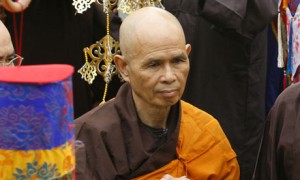Thirty years ago a group of Trappist monks at a monastery in Oregon introduced me to sitting meditation, and invited me into my first Zen meditation retreat. At first I found this practice awkward and rather jarring. Sitting still could be very uncomfortable, physically and psychologically. Why would anyone want to put themselves out in this way? But something in the cleansing physicality and heart-based orientation of the practice took hold of me. The burdens of a life based on abstract "belief" found relief in the act of just sitting and watching. The experience of direct insight seemed to reside in this simple act. Slowly, often by fits and starts, my commitment to meditation practice spread into the core of my life. It took years of trial and error for the roots of practice to gain personal traction. But these day my regular sitting practice, and habit of doing silent meditation retreats several times a year, has a profound impact on how I experience my life in the world. The flow line between my active and contemplative lives grows more intertwined with each passing year.
So this recent interview with Vietnamese Zen Master Thich Nhat Hanh resonated deeply with me. Last week I shared a story about the power of love in the domain we're all most familiar with - personal relationships. This week I want to share Thich Naht Hanh's reflections about the power of love in a domain where it is seldom considered - climate change and climate activism.
In a recent piece by Joe Confino in the Guardian, entitled Only love can save us from climate change, Nhat Hanh that makes this connection explicit. Among living Buddhist teachers, perhaps only the Dalai Lama is better known than the 86-year-old "Thay", as he is known to his followers. Thay's commitment to living within the simplicity of his Plum Village monastic community in France has not stopped him from writing over 100 books, and building thriving monastic communities in Thailand, Hong Kong, the U.S. and Germany. He has hundreds of thousands of followers world wide.
Thay believes the reason people remain in denial of global warming, despite overwhelming scientific evidence, is that most of us are mired in our own personal suffering, and are too afraid to open to the plight of Mother Earth. In his conversation with Confino, Thay suggested that "our search for fame, wealth, power and sexual gratification provides the perfect refuge for people to hide from the truth about the many challenges facing the world. Worse still, our addiction to material goods and a hectic lifestyle provides only a temporary plaster for gaping emotional and spiritual wounds, which only drives greater loneliness and unhappiness."
To a heart that is open, this spectacle of self-imposed suffering ought to engender compassion rather than judgement. Leading with compassion is not only the best way to change hearts, it is the only way. Many people "want to get busy in order to forget. We should not talk in terms of what they should do, what they should not do, for the sake of the future. We should talk to them in such a way that touches their hearts, that helps them to engage on the path that will bring them true happiness; the path of love and understanding, the courage to let go. When they have tasted a little bit of peace and love, they may wake up."
I know that I am still a beginner in manifesting this kind of love. Perhaps I always will be. The complexity of our human life has a way of subverting even our best intentions, and perfection is never possible. But I can also feel how the tendrils of compassion are growing stronger in me, often beneath the radar of conscious awareness. Each time I take my seat on the meditation cushion, each time I turn back toward my work in the world with a listening heart, I water these seeds of compassion. So I am coming to trust that Thich Naht Hanh is right. Even if it takes 100 million years, I will do it. And that part of me that is still alive 100 million years from now will continue to do it. It is when I feel the strength of this kind of resolve that my fear falls away.

